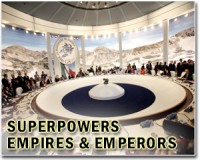| . |  |
. |
Beijing (AFP) March 5, 2011 Premier Wen Jiabao on Saturday acknowledged "great resentment" in China over growing income disparity, corruption and other problems, and vowed his government would work harder to meet public demands. In a "state of the nation" speech opening the annual 10-day session of the nation's rubber-stamp parliament, Wen admitted his government had "not yet fundamentally solved a number of issues that the masses feel strongly about." These included high consumer and housing prices, "significant problems concerning food safety and rampant corruption", and people being illegally kicked off their land to make way for unrestrained property development. China will "effectively solve problems that cause great resentment among the masses," Wen told the NPC's nearly 3,000 delegates in his two-hour address at the Great Hall of the People in the heart of Beijing. "We must therefore have a strong sense of responsibility toward the country and the people and work tirelessly and painstakingly to solve these problems more quickly to the satisfaction of the people," Wen said. The National People's Congress convened amid an increase in tension after a similar mix of issues helped spark unrest across the Arab world. Topping the agenda is inflation and Wen pledged the communist leadership would step up its fight to contain rising prices of food, housing and other essentials, warning the problem "affects social stability". "We must therefore make it our top priority in macroeconomic control to keep overall price levels stable," he said, reiterating the government's 2011 inflation target of around four percent. Inflation has remained stubbornly high -- 4.9 percent in January -- despite a series of policy steps including three interest rate hikes in recent months. The consumer price index rose by a more than two-year high of 5.1 percent in November. Inflation has a history of sparking unrest in China, with its hundreds of millions of poor farmers and low-paid workers scraping to get by. Wen indicated the government's macroeconomic offensive would continue, saying: "We will implement a prudent monetary policy." Decades of blistering export-dependent growth have made China's economy the second-largest in the world. But China has struggled to spread the wealth evenly among its 1.3 billion population and Wen referred repeatedly to that issue in his speech, lamenting China's "large income gap". Beijing now wants to follow a more sustainable, environmentally-friendly path under a revamped economic growth blueprint for 2011-2015 that calls for more balanced development that leaves fewer people behind. The premier noted China's annual eight percent economic growth target for 2011 -- considered the minimum required to keep the economy growing fast enough to stave off social unrest. That goal is routinely surpassed each year. Last year, the economy grew 10.3 percent. But Wen also reiterated a pledge made last Sunday that China would aim for a less frenetic seven percent annual growth under the new five-year plan. He pledged to create 45 million urban jobs over the next five years, "reduce the number of people living in poverty," increase incomes, raise minimum wages and basic pensions, and hike the individual income tax threshold. "We will continue to increase government spending used to help expand consumption, and increase subsidies to low-income urban residents and farmers," he said. And Wen repeated government promises to curb property speculation blamed for surging prices and ensure a supply of low-income housing. The government will work to "genuinely stabilise house prices and meet the reasonable demands of residents for housing," he said. The urgency of appeasing disgruntled constituencies came into focus in the past two weeks with mysterious Internet calls for weekly Sunday "strolling" rallies in major Chinese cities. They have largely fizzled under smothering security but the heavy police response revealed official concern over public dissatisfaction. A mix of similar hot-button issues -- combined with a lack of democracy -- sparked popular uprisings in Tunisia, Egypt, Libya and elsewhere in the Arab world. China's powerless parliament approves whatever is submitted by the ruling Communist Party, which uses the annual session to outline its concerns and the overall policy direction for each year.
Share This Article With Planet Earth
Related Links Learn about the Superpowers of the 21st Century at SpaceWar.com Learn about nuclear weapons doctrine and defense at SpaceWar.com
 Double-digit rise for China's military spending
Double-digit rise for China's military spendingBeijing (AFP) March 4, 2011 China announced a renewed double-digit hike in military spending on Friday after funding slowed last year, but insisted the nearly $92 billion outlay posed no external threat despite concerns abroad. The defence budget will rise 12.7 percent in 2011 to 601.1 billion yuan ($91.7 billion), said Li Zhaoxing, spokesman for China's national parliament, citing a budget report to be submitted to th ... read more |
|
| The content herein, unless otherwise known to be public domain, are Copyright 1995-2010 - SpaceDaily. AFP and UPI Wire Stories are copyright Agence France-Presse and United Press International. ESA Portal Reports are copyright European Space Agency. All NASA sourced material is public domain. Additional copyrights may apply in whole or part to other bona fide parties. Advertising does not imply endorsement,agreement or approval of any opinions, statements or information provided by SpaceDaily on any Web page published or hosted by SpaceDaily. Privacy Statement |